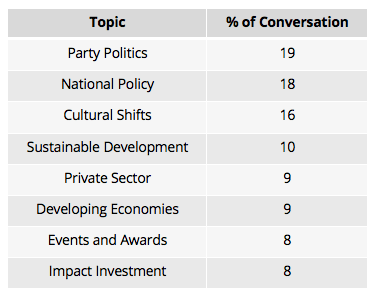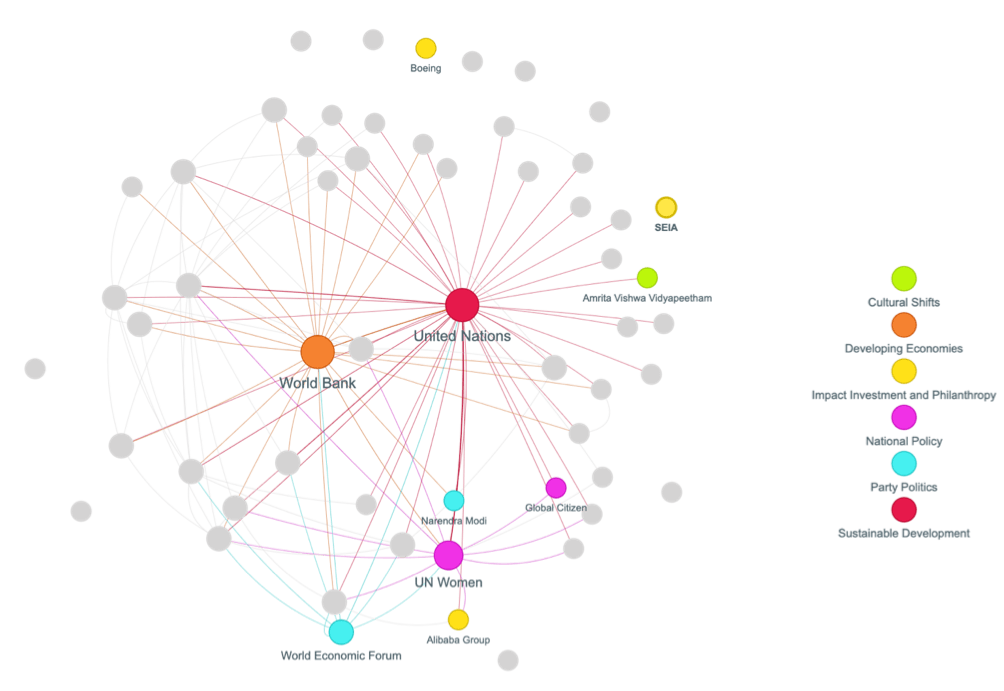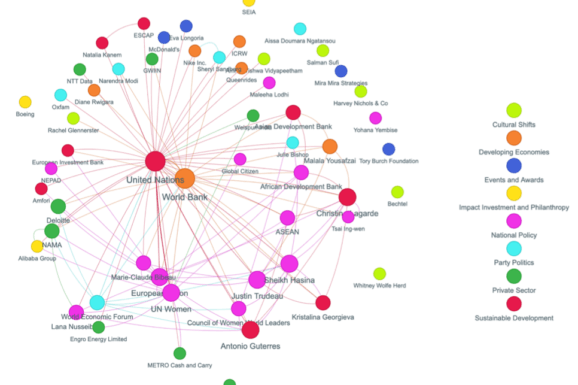In this month’s Map of the Month, Handshake explores the topic of women’s empowerment by looking at the individuals and organizations making a commitment to gender equality as part of their work.
Through our research, we found that the broad conversation taking place around women’s empowerment can be broken down into eight subtopics, ranging from politics and policy, to investment strategies. Comprising nearly 40 percent of the conversation, are the topics of Party Politics and National Policy that cover policy-oriented approaches to addressing gender equality and women’s empowerment. This fact shows that much of the conversation is focused on identifying policy solutions to address gender inequality, and implementing policy measures to create more opportunities for women in the workplace.

We then looked at the global conversation on these topics within three broader issues that cut across the eight above topics. These include:
- Sustainable Development;
- Developing Economies;
- Impact investment and Philanthropy
- Sustainable Development

When researching the intersection between women’s empowerment and sustainable development, we uncovered the following findings:
- The topic of sustainable development is heavily influenced by conversations around sustainable development and efforts to empower women, which all take place within the context of the UN Sustainable Development Goals (SDGs).
- The majority of conversations taking place within the sustainable development context involve smaller groups of individuals whose focus is solely on national and international development policy.
- The clear dominance of global institutions, and the marked absence of strong private sector partners, indicates that it will be difficult for smaller social enterprises and small to mid-size companies to engage in this conversation in a sustained and impactful way. This is unless these smaller actors are willing to invest the time and resources needed to position themselves as influential players within this space.
2. Developing Economies

In looking at the intersection between developing economies and women’s empowerment, we gathered the following insights:
- Conversations around empowering women within the context of economic development overlap with each other when both are viewed more broadly within the larger conversation around national policy.
- The conversation is crowded, with a multitude of voices, including multilaterals, regulators and private companies, inserting their input.
- Many participants engaged in this topic have a specific regional or national focus, making it a narrower and more fragmented topic, compared to others.
- Individual influencers take a more active role by leading conversations around this topic. This creates an opportunity for them to leverage their “star power” to make substantive contributions to this conversation.
- Individual influencers are only successful at entering this conversation if they do so by joining with large multilateral players such as the World Bank, the United Nations, WEF, African Development Bank, and EU in this effort.
3. Impact Investment and Philanthropy

As indicated through the relatively small number of highlighted actors, Impact Investment and Philanthropy is the smallest component of the overall conversation taking place around women’s empowerment. Insights about this conversation include:
- Conversations around this topic are primarily focused on empowering women through philanthropic initiatives and investments.
- The United Nations and the World Bank consistently drive and lead conversations around this issue, which creates a clear shortage of private-sector voices, particularly those whose focus is on social issue advocacy.
- The conversation is driven predominantly by global multilaterals and often takes place within their annual forums, i.e. UN Global Goals Week the World Bank, World Economic Forum (WEF) and Global Citizen. Because of this, there are opportunities for multiple players to enter this conversation and provide unique perspectives around women’s empowerment, as it relates to Impact Investment and Philanthropy.
Recommendations to Build Influence in the Women’s Empowerment Network
Based on these insights, Handshake has developed the following recommendations for individuals, companies and organizations who are hoping to build their influence in this network:
- There is room in the network for companies to leverage their existing business models and corporate policies to demonstrate how investments in creating opportunities for women can have a powerful impact. That said, larger outcomes that can come as a result of this – including gaining recognition for these efforts – are not immediate, and will require invested time and effort.
- Global forums such as the UN Global Goals Week and WEF’s Annual Meeting at Davos can create natural entry points into this conversation by leveraging existing connections with their key influencers.
- The conversation around Economic Development is particularly receptive to new ideas and points of views around investments in women’s empowerment and the impact they have in communities where women live and work.
- Within these conversations, there is an opportunity to highlight connections between Impact Investment and Economic Development in order generate further discussions that can reach audiences on a global scale.
